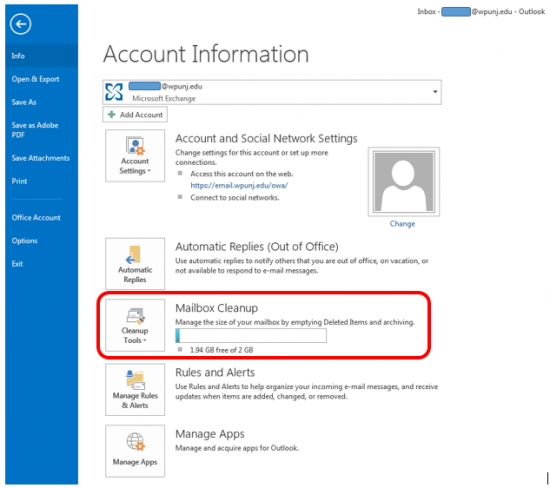Outlook Troubleshooting: Difference between revisions
Jump to navigation
Jump to search
Sanchezc10 (talk | contribs) No edit summary |
Sanchezc10 (talk | contribs) |
||
| Line 35: | Line 35: | ||
#In the Advanced Find window, click Browse | #In the Advanced Find window, click Browse | ||
#In the Select Folder(s) window, expand the "Inbox" and select all the subfolders beneath it | #In the Select Folder(s) window, expand the "Inbox" and select all the subfolders beneath it | ||
: | #:'''Note:''' Selecting the "Search subfolders" check box at the bottom of the window does not select all the subfolders in Inbox. | ||
#Click Okay | #Click Okay | ||
#Proceed to enter your search criteria in the "Search for the word(s):" field. You may also want to change the "In" field to "subjectfield and message body" instead of "subjectfield only" by using the drop down menu. | #Proceed to enter your search criteria in the "Search for the word(s):" field. You may also want to change the "In" field to "subjectfield and message body" instead of "subjectfield only" by using the drop down menu. | ||
Revision as of 15:05, 23 February 2016
Performance Issues
Outlook is Performing Slowly
Outlook can start to slow down when folder sizes increase upwards of 5,000 items. If you are experiencing slow performance issues, identify any folder larger than 5,000 items and clean it up.

- Open Outlook
- Select your inbox
- On the "details" bar, see how many items are in the folder
- Take action to bring the folder item count lower than 5,000
- Delete unnecessary items
- Move items to a different folder
- Create a new folder to move items into
- Select other folders and view the "details" bar to verify they are under 5,000 items as well. Common folders all users should check include:
- Inbox
- Subfolders
- Sent Items
- Deleted Items
Clean up Mailbox
If your mailbox size is reaching the limit, Outlook provides the following tools to assist
- File > Look at the Mailbox Cleanup graphic & text. Here you can see how much space is free.
- File > Cleanup Tools > Mailbox Cleanup
- Select "Find items larger than XXX kilobytes
- Change the number to 600
- Click Find
- If you have a lot of results, click the Size column and target the largest emails first.
- File > Cleanup Tools > Mailbox Cleanup
- Click Empty to empty the deleted items folder.
- Everything in your Deleted Items folder will be permanently deleted. Click Yes to continue.
Search Results Vary
If you the "quick search" in your inbox is not showing all of your message, try the following:
- Bring up the Advanced Find window by pressing Ctrl+Shift+F
- In the Advanced Find window, click Browse
- In the Select Folder(s) window, expand the "Inbox" and select all the subfolders beneath it
- Note: Selecting the "Search subfolders" check box at the bottom of the window does not select all the subfolders in Inbox.
- Click Okay
- Proceed to enter your search criteria in the "Search for the word(s):" field. You may also want to change the "In" field to "subjectfield and message body" instead of "subjectfield only" by using the drop down menu.
